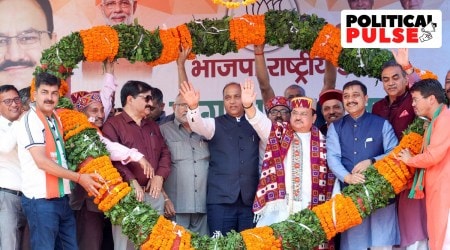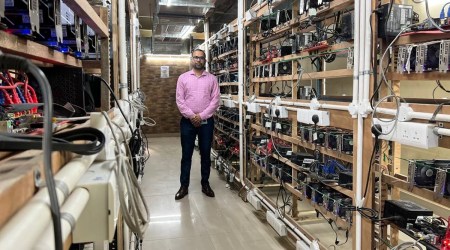TWO YEARS ago, state prisons began allowing inmates audio and video calls to their families since physical meetings were not possible amid the Covid-induced lockdown. With physical meetings now resumed, most prisons have discontinued calls, a decision criticized, and even challenged in court.
Apart from a Public Interest Litigation (PIL) filed before the Bombay High Court seeking resumption of the facility, undertrials have also been approaching courts to allow them to communicate with their families through audio and video calls. Prison authorities say that while the facility is required ‘in-principle’, the infrastructure needs an overhaul.
During the pandemic, the prison department had procured 138 smartphones to existing 76 coin boxes through which the calls were made to family. With the current prison population over 40,000 against the capacity of 23,217, these are grossly insufficient, an official said.
In the hearing on the PIL filed by human rights’ body People’s Union of Civil Liberties (PUCL), Chief Justice of the Bombay HC Dipankar Dutta called it an ‘important issue’ asking why the facilities cannot be allowed. “Not everybody can go to prison,” the court said, directing the state to file a reply. As per the Prison Statistics of India, Maharashtra ranks the highest in the country for the number of undertrial prisoners from other states. Of the 26,171 undertrials in the state, 16.4 per cent, or 5,263, are from other states, as per the 2020 report, the latest available.
Family members who communicated during the pandemic through the phone and video calls agree. Mulaqat — the term used in the state prisons for meetings — is allowed for undertrials once a week and once in 15 days for convicts. Separated by a glass partition, prisoners can speak to their families on an intercom. The mulaqat is allowed for 10-20 minutes.
Buy Now , Our best subscription plan now has a special price
Many families have to travel thousands of kilometers for this brief meeting. Madhu Devi Agarwal, a resident of Jhumri Telaiya in Jharkhand, nearly 2,000 kms from Taloja Central Jail in Navi Mumbai, where her husband has been lodged since September 2020, has not managed to visit him even once. Her son visited him in March but without any contact in Mumbai and the paucity of money to travel to the city regularly, the family has no option but to communicate with him through letters.
“While our letters reach him in 10 days or so, his letters take two-three weeks to get to us, based on when the jail authorities post them…Overall, it takes almost one and half months to complete a round of communication between us ,” Agarwal said.
Apart from the financial strain, loss of work in the days taken to travel and the lack of facilities outside prisons in facilitating mulaqats also deter families from visiting. “After my arrest, I could not wait for my family to come and meet me. Other undertrials however told me that there are no facilities for a toilet, drinking water, canteen, or a shed for visitors. I did not want my wife to suffer because of me or be humiliated. She is not an accused, I am. So, I told her not to visit,” an undertrial lodged in Taloja jail said.
Between November 2019 and February 2020, Tata Institute of Social Sciences (TISS) conducted a study across 11 prisons in Maharashtra, Delhi, Haryana and Tamil Nadu. The study found that other prisons, including Tihar in Delhi, had a facility for pre-booking through the phone or manually. In Maharashtra, visitors queue up from 8am for a mulaqat between 9.30am-1.30pm and from 2pm for a mulaqat in the second-half of the day. Names are called out on loudspeakers in some prisons through which relatives learn of their turn. Prisoners in Delhi are allowed to make calls through the Inmate Phone Call System to pre-registered and verified contact numbers for five minutes daily. In Gurugram, a software was installed to facilitate mulaqats and phone calls.
Prison officials, who did not wish to speak on record, as the matter is sub-judice in the High Court, said that a proposal for a similar software raised apprehensions since it was operated by a private party.
In the state, while phone calls are currently allowed at the discretion of the jail superintendent, most coinboxes are out of service.
A proposal to find an alternative to the coinbox is pending before the state government. “The coinbox phones are not available anymore. With those, there was a regulation of how much time a prisoner could speak as the call ended automatically when the coin dropped. Even if video/audio calls are started, there will be a need to have extra staff to supervise the process daily to prevent misuse,” the official said.
Meeran Borwankar, former additional DG (prisons) of Maharashtra, during her term in 2015, started video calls for prisoners on a pilot basis said the response to the facility was positive.
“Many families who, due to financial or other reasons, could not come to meet their kin in prisons, started using
the facility,” she said. But to replicate this across the state’s 36 prisons will be difficult without adequate staff, phones, and a system to facilitate the process, officials said.
The study by TISS referred to a Supreme Court judgment in 2017 citing the Nelson Mandela Rules on the necessity to maintain contact with the outside world for prisoners, with reasons including its role in rehabilitation, reducing isolation, and less likelihood of suicides in prisons.
In February, an undertrial, Nadeem Akhtar, whose trial in a blast case is yet to begin after over 10 years, made a plea to seek phone calls with his sister, a resident of Uttar Pradesh. “The relatives of the UTP (undertrial prisoner) are residing in another state. It is obviously difficult for them to attend the UTP at Taloja Central Prison. In view of the existing situation, it is difficult to compel them to attend from such a long distance,” the court said, while directing him to be allowed to make phone calls from jail. The directions, however, remain unheeded over lack of rules in the jail manual allowing calls.
,


